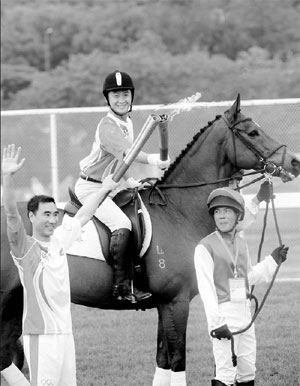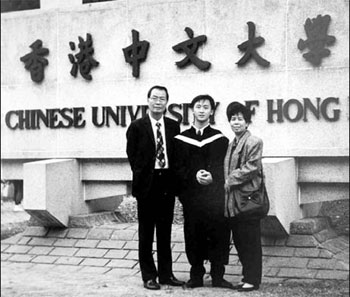Victory lap
May 2, 2008, was a red-letter day for the people of Hong Kong - 44 years after the Olympic torch first arrived on Sept, 1964, the island witnessed another historic moment.
For Nelson Yip Siu-hong, that moment was even more special because he was one of the 125 torch-bearers who carried the Olympic flame across the city.
The 200 m at Sha Tin racecourse that Yip ran on horseback, before handing the torch over to one of his fellow bearers, was not a great distance.
|
Hong Kong Paralympic equestrian rider Nelson Yip Siu-hong during the Hong Kong leg of the Olympic torch relay on Friday. File Photo |
But it has been a long and difficult journey for Yip. He is Hong Kong's only qualified athlete to compete in the Beijing Paralympics equestrian event, to be held in his home city this coming August.
"I asked them: 'Why me?'" Yip says, during an interview one week before the torch relay. "And they told me that I represented the spirit of Hong Kong."
That spirit is about perseverance, about always bouncing back and never giving up hope. It was the same spirit that anchored the lives of ordinary Hong Kong people living in matchbox 70s resettlement buildings, and the spirit that was called upon when the island was reeling from the Asian Financial Crisis in the 90s.
Born in 1968, Yip has been through all this. But it is nothing compared to his personal travails. He suffered cerebral palsy when he was barely eight months old and subsequently lost the use of both legs. Yip has grown up in what he describes as "double confinement" - the confines of a wheelchair and the confines of his own mind.
"I was a fourth-grade secondary-school student when I first went to see a local opera performance," Yip says. "And the reason I went, apart from the fact that I had always wanted to, was that for the two buses I took on that day, I didn't need to get off until they arrived at the last stop."
For the youngster, the idea of the whole bus watching him limp on crutches edge toward the door was simply too much to bear.
Today, Yip still remembers the numbers of the buses - 23 and 42.
Soon, however, Yip began to take matters into his own hands.
After leaving primary school for kids with special needs, Yip entered secondary school. Technical school, where most of his disabled classmates ended up, was never an option, because Yip didn't want to "spend life sweating in a factory workshop".
From there, he went on to enroll at the Chinese University of Hong Kong. That would be many years later. In between, he had to make many decisions, including one to end the painful and protracted treatment on his legs.
"I felt that it was sucking the life out of me," says Yip, referring to the long ordeal he had been put through since the age of 4, which included bone marrow aspiration, numerous acupuncture sessions and a three-hour operation that left him bed ridden for nine months.
In the eyes of the doctors, the decision was a sign of giving up. For Yip, it was the beginning of self-acceptance, of reconciliation with his body. "Before, I had been struggling futilely against myself. Now, I realized that there shouldn't be tension between this part of my body and the rest," he says.
It was not long before Yip made another decision -one that ultimately set him on his own path. He weaned himself off his total reliance on his mother.
"I had become central to her entire life" he says. "So when I eventually decided to change and be on my own, it was my mother who wouldn't adapt."
For four years, Yip lived in a university dorm with three of his fellow students. Left to fend for himself, he found the most trivial things a daunting task - to get a book from the top shelf at the library, for example.
"The campus of the university sits on a mountain slope and students had to run from one building to another in between classes. This was a big problem for me," he says. "By the time I knocked on the door, I was usually 15 minutes late, and exhausted."
In his third year at university, Yip bought a "six-hand" car with a scholarship and learned to drive it "only by hand", thus ending the days of "hectic running around."
The late American writer, Pulitzer Prize-winning author John Steinbeck once said, "A man on horse is spiritually, as well as physically, bigger than a man on foot." That was exactly how Yip felt when he first mounted a horse.
"For once, my legs didn't impose limitations on my movement," he says.
At that time, he was 32 and general director of the Hong Kong Rehabilitation Power - an organization he co-founded with eight friends in 1995 to help the city's disabled.
"I organized this trip to the Public Riding School in Tuen Mun because therapeutic horse riding is considered very effective for people with various special needs," he says. "And since I was the leader of the team, I felt obliged to climb on the horse first."
And he has never really climbed down. For the past few months, Yip has been going to Tuen Mun five days a week, to train for the coming Olympics. He left for Britain on May 3, the day after the torch relay, where he will receive training for three months before heading back for the big event.
In retrospect, Yip concedes that he was never as serious about the competition as about the sport.
In 2003, Yip went to Japan where he scored the highest mark for any disabled rider in the Japan Asia Pacific Dressage Championship. "The judge was not at all pleased with the fact that I had beaten the Japanese riders on their home turf. He insisted I compete in grade 3 instead of grade 2, which was tougher competition because the disability of the athletes was less severe."
At the judge's insistence, Yip's disability was reassessed - three times. It didn't change the results.
"I was deeply saddened because what the game, or any other such event, is supposed to do is to let us forget about our disabilities instead of being made more aware of them."
Yip recalls that one of his happiest moments was in Britain when he put some horses in the back of a truck and drove with friends to the countryside for a day of riding and camping. Life may not have been entirely kind to him, but he has embraced it nonetheless.
|
Yip with his parents at the entrance to the Chinese University of Hong Kong. Courtesy of Nelson Yip Siu-hong |
"The most important thing I have learned through horse-riding is not to give up," he says. "You may fall - you probably will fall a number of times. But every time you rise and get back in the saddle, you have become stronger."
In 2002, one year after Yip picked up regular horse-riding, he enrolled on an MBA course.
"Back in 1994, when I was applying for post-graduate study at the Chinese University of Hong Kong, an MBA as a possible choice never entered my head," he says. "What had it to do with me? Someone with an MBA degree is someone who sits on the board of a company, someone who wears bespoke suits and walks in the deep shadows of the skyscrapers in Central - anyone but me."
He now has two Master's degrees (the other is in statistics) and owns three companies, including one that makes energy-saving lighting for under-developed countries.
"The best part of any championship for disabled riders is that you get to meet people from all over the world. Each has his or her own very unique way to overcome the inconveniences that nature has caused them.
"And we have a common goal: To strive for excellence," Yip says. "That to me is the Olympic ideal."
(China Daily 05/07/2008 page20)
















